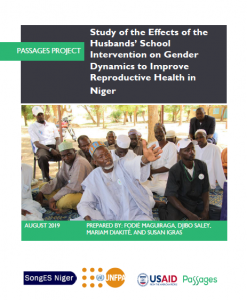Study of the Effects of the Husbands’ School Intervention on Gender Dynamics to Improve Reproductive Health in Niger
This study report represents one of several commissioned by the Passages Project to explore evidence gaps in understanding how community-based norms-shifting interventions lead to normative change.
Husbands’ Schools were designed to address the significant barrier of men not allowing their wives to access health services, in the context of where women have minimal personal decision-making power and financial resources. Engaging men in understanding the importance of reproductive health and services use for their couple and families and playing roles as community promoters, service linkers, and modeling supportive spouse behaviors would lead to more wives using reproductive health services. Anecdotal evidence indicated that gender effects were positive, but UNFPA and SongES needed and wanted a better understanding of the gender effects of Husbands’ Schools. This exploratory study aimed to understand how power-sharing was taking place between men, who were members of Husbands’ Schools, and their wives, and the broader community. From a norms perspective, what shifts did Husbands’ School activities lead to vis-a-vis member couples’ gender attitudes and roles relating to reproductive health decision-making and use of services? Were similar changes observed at a community level, indicating gender-equitable expectations (i.e., norms) around reproductive health and services use? The qualitative study sample included three regions in Niger to include sites in different phases of scale-up, allowing comparison of School effects on power-sharing and gender role shifting in different socio-economic and geographic regions.
Resource Snapshot

Year 2021
 Where We Work
Where We Work  Press Room
Press Room  FACT Project
FACT Project  Passages Project
Passages Project  Learning Collaborative
Learning Collaborative  Search All Resources
Search All Resources  Social Norms
Social Norms  Fertility Awareness Methods
Fertility Awareness Methods